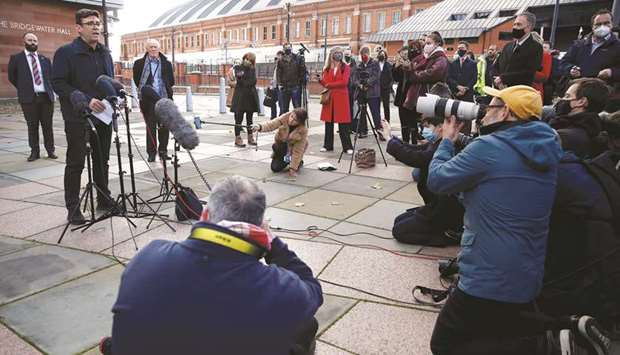Prime Minister Boris Johnson said yesterday that he will impose tougher coronavirus restrictions on the English city of Manchester, defying local leaders who bitterly opposed the move without extra cash.
He said the city region of around 2.8mn residents would enter the highest risk category from Friday but, for the first time under a new system of localised curbs, would do so without the support of its mayor and other leaders.
The Conservative premier said that ministers had spent 10 days trying to reach an agreement with Greater Manchester mayor Andy Burnham and that the government had made a “generous offer” of financial support.
“The mayor didn’t accept this, unfortunately, and given the public health situation, I must now proceed with moving Greater Manchester to the ‘Very High’ alert level,” Johnson said at a press conference.
“I do regret this ... we would have a better chance of defeating the virus if we work together,” he added.
The acrimonious split threatens to undermine Johnson’s latest strategy of local lockdowns across England – other parts of the UK set their own rules – which he hopes will allow him to avoid the kind of national shutdown imposed in March.
Shortly before he spoke, Burnham, from the main opposition Labour party, hit out at the government for walking away from the talks after Johnson had set a deadline of midday yesterday for an agreement.
He had been holding out on agreeing to shut nightspots and other venues, warning that low-paid workers could sink deeper into poverty unless the government improved its financial offer.
“At no point today were we offered enough to protect the poorest people in our communities,” Burnham told reporters, flanked by leaders from several surrounding towns that make up the Greater Manchester region.
“I don’t believe we can proceed as a country on this basis through the pandemic by grinding communities down through punishing financial negotiations,” he added. “We are asking a lot of the public at this difficult time, and we need to carry them with us, not crush their spirit.”
The Manchester mayor said Johnson’s government had steadfastly refused to meet his demands for a package of £65mn ($84mn), which he called “the bare minimum to prevent a winter of real hardship here”.
Burnham was visibly shocked when presented with news live on air that the government, instead of its reported offer of £60mn, was now reverting to an initial package worth just £22mn.
He called on parliament to intervene to ensure a “fair financial lockdown”, but also urged residents to comply with the new rules.
National Labour leader Keir Starmer said the collapse of the talks was “a sign of government failure” and accused Johnson’s Conservatives of treating communities in Manchester and other hard-hit parts of England “with contempt”.
Britain has suffered Europe’s worst death toll from coronavirus, with nearly 44,000 deaths, despite imposing a nationwide stay-at-home order in late March.
With fears of a second wave – more than 21,000 new cases and 241 new deaths were reported yesterday – its four devolved governments are adopting different levels of restrictions to contain infection rates.
Northern Ireland last week announced it would shut down nightspots and restaurants for a month and extended the school holidays, while Wales will impose a two-week shutdown from Friday.
However, Johnson is persisting with a more localised strategy for England.
Manchester joins the city of Liverpool and nearby county of Lancashire in entering the highest of the government’s three-level approach based on the local prevalence of the coronavirus.
Under that regime, many nightspots and other venues will be closed for four weeks and residents will be barred from meeting anybody outside their household indoors.
Talks are ongoing this week with several other northern English regions with the highest virus rates, which also face entering the category.

Burnham: At no point today were we offered enough to protect the poorest people in our communities.


